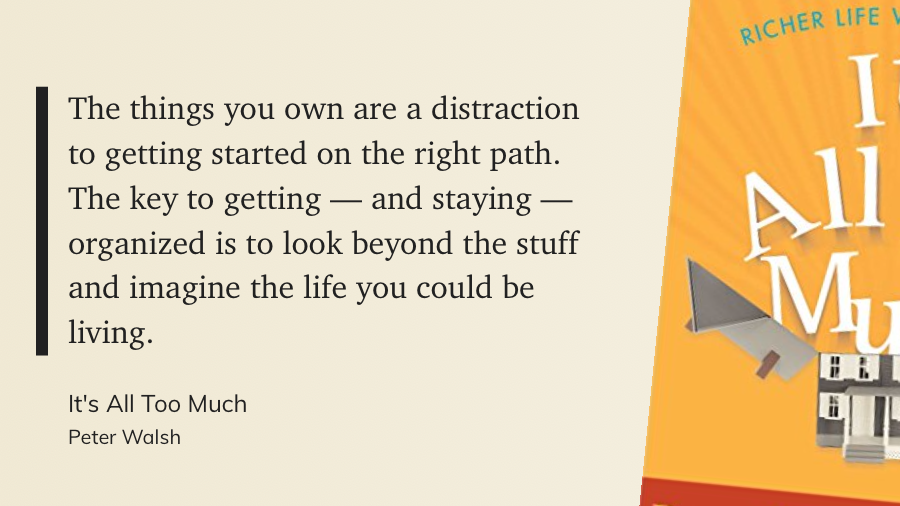It’s All Too Much by Peter Walsh
Imagine the life you want to live
“The things you own are a distraction to getting started on the right path. The key to getting — and staying — organized is to look beyond the stuff and imagine the life you could be living.”
That’s the place to start—imagine the life you could be living. Don’t let past decisions lock you in. Every moment presents an opportunity for a new choice or to change your mind.
“The first task I give my clients, and the first challenge I want to present to you is: Imagine the life you want to live.”
On setting up your home
Presumably, you can control what’s in your home. Is there anything there that causes you stress? If so, can you do anything about it? Look at every space in your home and consider if matches with the vision for the life you want to live or if it gets in the way.
“No one should feel stressed out when they open the door to their own home. No one has to. Your home is within your control. It should be the place where you escape all negative forces in the world. Your home should be the antidote to stress, not the cause.”
“Does this house look the way I want it to look? Does this house feel like a home to me? How do I feel when I come home to this place? How do I want to feel when I come home to this place?”
“The single most important factor in deciding what you should have in your home is now clear: Does this item enhance and advance the vision I have for the life I want or does it impede that vision? This is the only question you should ask yourself when looking at the clutter that fills your home.”
“So think about your house. Does each room serve its intended purpose? Is each piece of furniture, countertop, or appliance used to do what it was designed to do? If the answer is no, it’s time to rethink your use of each space.”
How to deal with clutter
Look at every item in your home—from kitchen gadgets to clothes. Evaluate if it’s worth keeping. Does it support your vision? Does it get in the way? Do you feel good when you wear the clothes in your closet? If not, eliminate it now. Don’t settle.
“Ask yourself these questions as you encounter each piece of clutter: Do I use this? How long has it been since I’ve used it? Will I use it again? Is it worth the space it takes up in my house?”
“You should only have clothes in your closet that: you love fit you well now make you feel good when you wear them people compliment you on when you wear them.”
“Keep all horizontal surfaces clear
The way you feel about a space is set the moment you step into it. Set the mood for an efficient workspace and keep your office uncluttered by ensuring that any desk surface, countertop, or table is kept clear of paperwork and clutter. If you don’t start piles, they can’t grow.”“Junk mail is your enemy!
Imagine there is a knock at your door. You open the door to see a man with a can of spray paint in his hand. Do you: a) invite him in, or b) slam the door in his face? This is how you should think of junk mail! It’s an intruder waiting to get inside and wreak havoc.”
After decluttering
Control the in/out. When you bring something new into your home, what can you remove? Buy a new toy, get rid of one. Consider cost versus space. Something that takes up a lot of room costs you more. Spend More time deciding to buy bigger items. When you decide not to buy, put that money into an experience fund. Something fun you/your family can look forward to and pay for with the money saved.
“Now that your home is the way you want it, for everything that comes into your home, something must go. The thing that goes must either be the same type as the new item or take up the same amount of room.”
Experience fund:
Every time you stop yourself from making a spontaneous purchase, put the money that you would have spent in a special account called your “experience fund.”“Pick an experience that your whole household can look forward to — a trip to Paris, the beach, Disneyland, etc. If your child asks for a toy at the store, you can do the same thing. Say, “This toy costs nine dollars and ninety-nine cents. Let’s put that in the Disneyland fund instead.””
It’s All Too Much by Peter Walsh

BEST ACTIVEWEAR says:
Magnificent site. A lot of helpful info here. I am sending it to some friends ans additionally sharing in delicious.
And naturally, thanks to your effort!